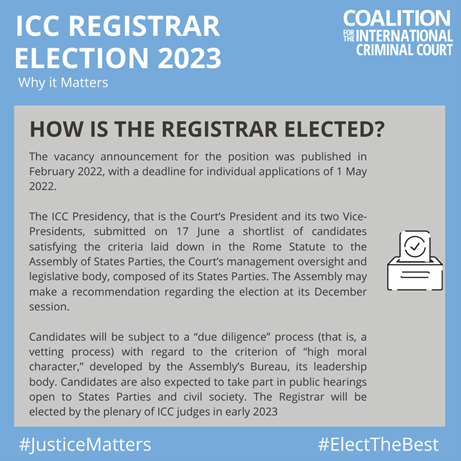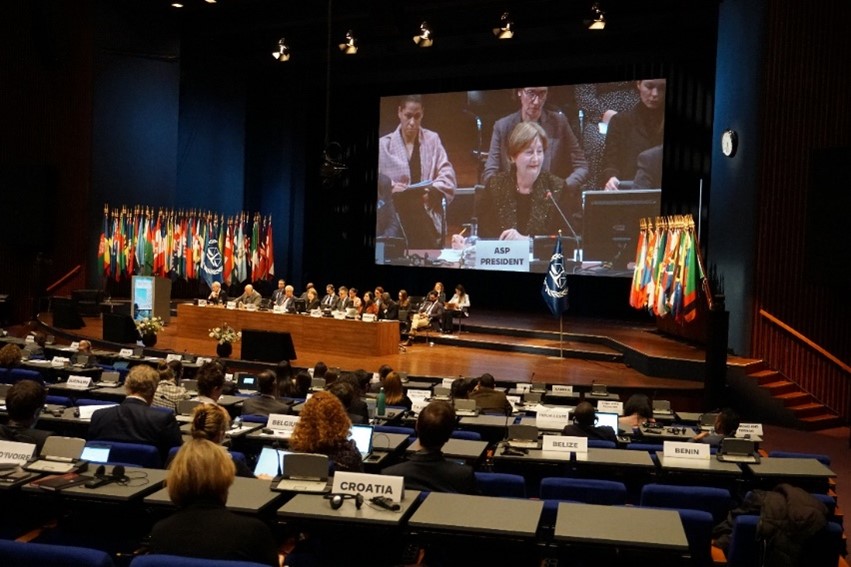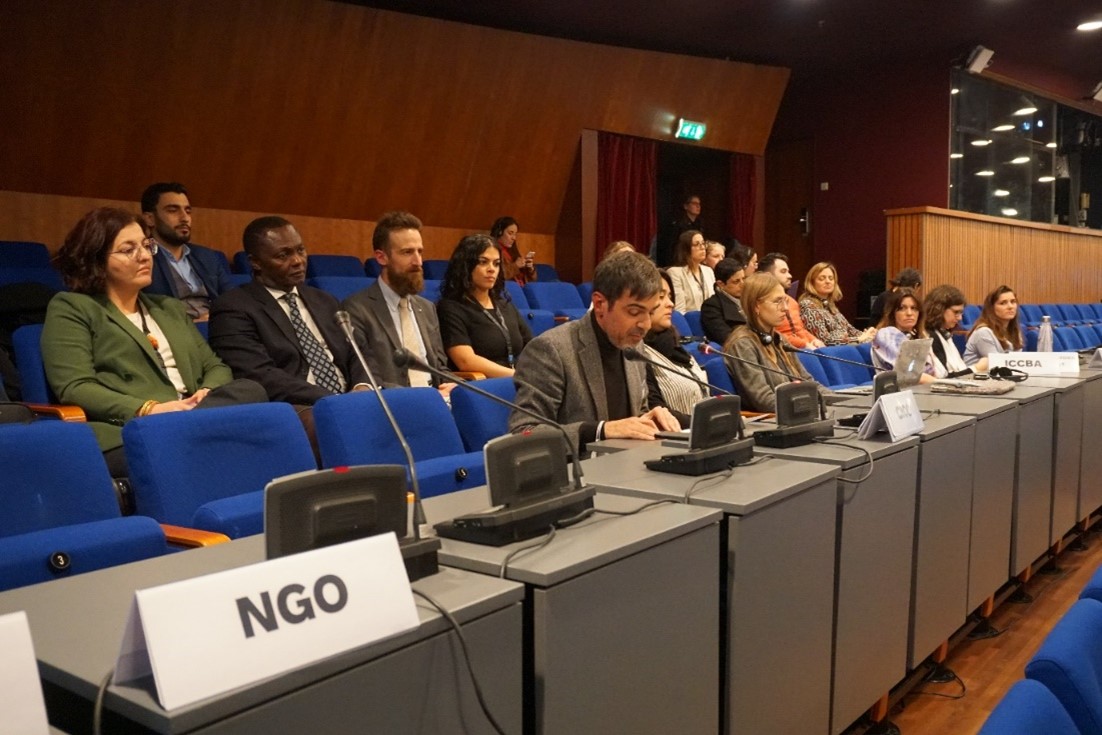SUMMARY DAY FIVE
ASP21 Day 5: ASP21 closes with low increase of ICC budget and commitment to protect civil society and human rights defenders
21st session of the Assembly of States Parties 2022, The Hague, The Netherlands
9 December 2022
The plenary session scheduled for the morning of Friday, day five of the ASP session, started with the presentation of the draft resolutions, which were submitted in the afternoon for consideration and adoption by the Assembly.
Negotiations on the ICC’s programme budget for 2023 continued throughout the week, consensus was achieved around mid-day, allowing for the final plenary sessions to take place in the afternoon of Friday (see outcome below). The final plenary included the consideration and adoption of resolutions, including statements from States Parties and the Coalition for the ICC.
Civil Society takes the floor at the resumed Cooperation session
On Thursday, the plenary session on Cooperation had been concluded following speakers on the second panel, without giving the floor to the list of speakers who wished to comment on the panel interventions. Thus, on Friday, the Assembly held a resumed segment allowing three states parties, Czech Republic, Belgium and Serbia; one State not party to the Rome Statute: the United States; and two Coalition members, Al Haq and the Moroccan Centre for Peace and Law to make interventions.

Recommendations on the Election of the next ICC Registrar
A recommendation on the election of the Registrar was adopted by the ASP on Day 5. States parties recommended Judges to elect the next Registrar considering a list of recommendations that includes, the need to ensure high standards of efficiency, competency and integrity, and assigning high priority to equitable geographical and gender representation, amongst others. ICC judges will elect the next registrar before March 2023 taking into account the recommendations by states.

Election of six members of the Committee on Budget and Finance
The African group had been unable to reach consensus on a candidate before the date originally scheduled for the CBF elections (5 December), thus the election by the Assembly was postponed to allow for further negotiations. On Day five, the Group of African States reached consensus and decided to elect two candidates to split the three-year term: Malawi for the first half and Sierra Leone for the second.
The six new members of the Committee on Budget and Finance (CBF) elected at ASP 21 are:
- Jasleen Chaona Chirembo (Malawi) (Split term with Sierra Leone candidate)
- Sahr Lahai Jusu (Sierra Leone) (Split term with Malawi candidate)
- Urmet Lee (Estonia)
- Daniel McDonnell (United Kingdom)
- Klaus Stein (Germany)
- Pascual Tomas Hernandez (Spain)
- Ana Patricia Villalobos Arrieta (Costa Rica)
States Parties reach consensus on limited increase on ICC Budget
The final plenary and closing session took place on Friday afternoon, instead of Saturday as originally scheduled. The Assembly adopted all ASP21 resolutions including the one on budget, which was finally ready for consideration after a complex and drawn-out consultation process.
The Assembly approved a programme budget of €173,234,300 for the Court in 2023, which represents an increase of 12.2% compared to the Court’s 2022 approved programme budget, or €18.4 million.The approved budget includes the annual contribution to the host state and interest accrued for the ICC premises, €3.58 million.
For 2023, the ICC requested a programme budget of €186,826,400 and the Committee on Budget and Finances (CBF) had recommended States adopt a budget of €179,576,600. While the figure of 12.2% is higher than any increase adopted by States in the last several years, inflation has skewed the figure, and in reality, represents an increase of only a few percentile points over last year’s approved budget.
Since the beginning of the year, the Coalition has been active in encouraging States to adopt a budget that is sustainable and sufficient, and matches the Court’s increasing workload, as a means towards ensuring it is equipped to execute its ultimate mandate of delivering justice to victims of Rome Statute crimes.
Several states parties took the floor at the adoption of the resolution on budget in order to explain their positions. The Netherlands made a statement on behalf of 18 states parties: Austria, Belgium, Denmark, Estonia, Finland, Ireland, Latvia, Liechtenstein, Lithuania, Luxembourg, New Zealand, Norway, Slovakia, Slovenia, South Africa, State of Palestine, Switzerland, and the Netherlands, welcoming the budget adopted by consensus, despite the final figure being lower than they would have liked, which has implications on the Court’s capacity. The United Kingdom and Sweden aligned themselves to the statement delivered by the Netherlands. Kenya, on behalf of the Africa group, and Mexico, on behalf of the Group of Latin America and the Caribbean, expressed their disappointment with the final figure adopted by States, referring to the domestic financial situations of states in their regional groups, and indicated that such an increase should be exceptional. Other states that took the floor included: Bangladesh, France, Poland, Palestine, and Denmark. Some of them found the adopted budget to be too low, and others, too high, and none were satisfied with the outcome.
Other key decisions at #ASP21
Negotiations on the resolution “Strengthening the International Criminal Court and the Assembly of States Parties” (or “Omnibus” resolution ICC-ASP/21/Res.2) took place during the Assembly, with states agreeing on pending language by mid-week. This year’s “Omnibus” resolution included a new paragraph (Operative paragraph 2: “Reaffirms its support for the consistent implementation of the Court’s mandate across the situations and cases under its jurisdiction in the interests of justice and the victims’ right of access to justice, and stresses the need for sustainable resources for all situations and cases as well as cooperation with the Court to that end”.), upholding the need for the Court’s mandate to be exercised equally across all situations before it and to ensure the Court has sufficient resources to execute its mandate.
Other decisions on the terms of reference of the Advisory Committee on Nominations or the Regulations of the Trust Fund for Victims can be found in the Annex of the Omnibus resolution.
The Assembly also adopted the report of the Bureau, which included the implementation of Independent Expert recommendation R169, which refers to the development of a strategy by the Assembly to respond to threats and attacks on the Court, its officials and those cooperating with it, which include civil society and human rights defenders. This also included an annex with a non-exhaustive list of potential measures for the ASP to take.
At ASP21, the Assembly mandated the Bureau to establish a due diligence process for candidates to the upcoming judicial election in 2023, to be developed in consultation with the Independent Oversight Mechanism and the Advisory Committee on Nomination of Judges.
The Assembly also adopted Resolution on the Review of the ICC and Rome Statute system, which extended the mandate of the Review Mechanism for another year. The Mechanism is the body established to oversee the assessment and implementation of the Independent Expert Review recommendations on improving the efficiency of the ICC and Rome Statute system.
Further, the Assembly adopted an amendment to the Rules of Procedure and Evidence, regarding the continuation of proceedings in the temporary absence of a judge for illness or other unforeseen urgent personal reasons, which was discussed jointly in the Study Group on Governance and the Working Group on Amendments.
Finally, the Assembly adopted a Resolution on Cooperation expressing amongst others concerns the outstanding arrest warrants or surrender requests against 14 individuals and “urging States to cooperate fully in accordance with their obligation to arrest and surrender to the Court.” The Assembly decided to continue to assess the recommendations made by the Independent Experts related to cooperation and their follow-up, and to report thereon to the Assembly at its twenty-second session.
List Resolutions adopted at ASP21:
- Resolution 1: Resolution on the proposed programme budget for 2023, the Working Capital Fund for 2023, the scale of assessment for the apportionment of expenses of the ICC, financing appropriations for 2023 and the Contingency Fund
- Resolution 2: Strengthening the International Criminal Court and the Assembly of States Parties (“Omnibus” Resolution)
- Resolution 3: Resolution on Cooperation
- Resolution 4: Review of the International Criminal Court and the Rome Statute system
- Resolution 5: Amendment to the Rules of Procedure and Evidence of the International Criminal Court
Recommendations and decisions adopted at ASP21:
Closing of ASP21
Before closing the session and giving the floor to the Coalition for the ICC, ASP President Fernandez de Gurmendi acknowledged the security concerns that human rights defenders are facing as expressed by both States and civil society throughout the 21st session and, working towards the next ASP session, committed to identify ways to address these concerns, including by looking into enhancing the security of everyone who accesses the Assembly. “We need to ensure that the Assembly offers a security space where risks of reprisal are minimised to the fullest possible,” she said, adding that she would reach out to other organizations, including the United Nations, to get their own experience in this regard.

President Fernandez de Gurmendi made specific reference to statements delivered by Coalition members in the General Debate, bilateral meetings held between members of civil society, including the Coalition Secretariat, and the ASP President, as well as the side-event co-organized by the Coalition on this topic earlier in the week.
The Coalition for the ICC delivered a statement before the formal closure of the session. The statement, delivered by Dr. David Donat Cattin, Secretary General of Parliamentarians for Global Action on behalf of the Coalition, made reference to the role of human rights defenders, and the challenges they face for the work they do on the ICC; called on States Parties to safeguard the participation of civil society in the work of the ASP and to remain vigilant and continue to protect and defend human rights defenders. The statement also addressed the need for States to provide sufficient and sustained resources to support the work of the Court, and underscored the importance of a vetting mechanism for all ICC and ASP elections.

The Assembly decided to schedule its next session (#ASP22) from 4 – 14 December 2023, at the United Nations in New York, USA.
Side events that took place on day 5 of ASP21:
- Strengthening Accountability Globally. Concrete steps to bolster the international justice ecosystem (co-hosted by Belgium, Chile, Ireland, Mexico and Human Rights Watch)
- Justice for the Rohingya: Paths Forward (co-hosted by Bangladesh, the Gambia and No Peace Without Justice)
- Book presentation « Code de Conduite Professionnelle des Conseils un Commentaire Article par Article » Philippe Currat (hosted by Club des Amis du Droit du Congo (CAD))
- Book Launch – Reed Brody’s ‘To Catch a Dictator’ – The Trial of Hissène Habré and the search for justice in an age of impunity (co-hosted by Belgium and the International Commission of Jurists)
- Launch of the MENA (Middle East and North Africa) Working Group on International Justice (hosted by Justice Call)
- Judicial Selection, Evaluation, and Trial Management in International Criminal Tribunals: Featuring a Proposal for the Optional Pre-Election Accreditation of Judicial Candidates (co-hosted by Ecuador, Switzerland and the International Criminal Law Practice Project of the American Bar Association’s Criminal Justice Section and Center for Human Rights)
- International Criminal Law as Justice: Foundations and Future Direction. Joint Book Launch for Professors Darryl Robinson and Carsten Stahn (hosted by Canada)
